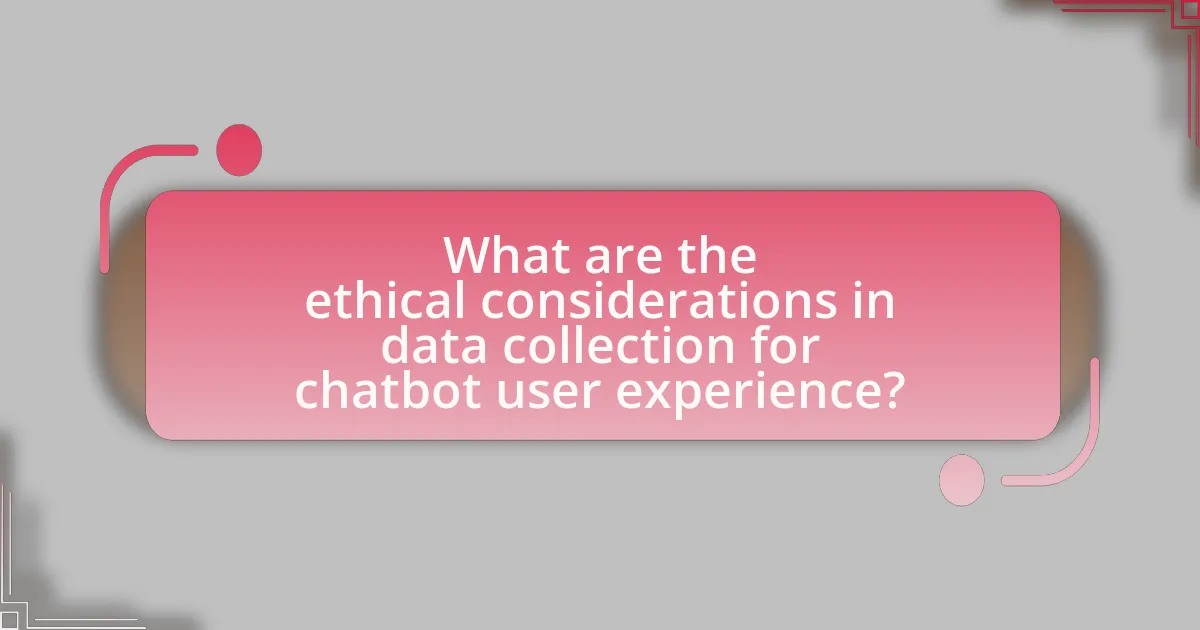The article focuses on the ethics of data collection in chatbot user experience, emphasizing the importance of user consent, data privacy, and transparency. It outlines how ethical data practices enhance user engagement and satisfaction while addressing the risks associated with unethical data collection, such as trust erosion and legal consequences. Key principles guiding ethical data collection include transparency, consent, data minimization, and user privacy, supported by frameworks like the General Data Protection Regulation (GDPR). The article also discusses best practices for organizations to ensure ethical data collection, including user feedback integration and effective communication of data practices.

What are the ethical considerations in data collection for chatbot user experience?
Ethical considerations in data collection for chatbot user experience include user consent, data privacy, and transparency. User consent is crucial, as individuals must be informed about what data is being collected and how it will be used. Data privacy involves ensuring that personal information is securely stored and protected from unauthorized access, which is supported by regulations such as the General Data Protection Regulation (GDPR) that mandates strict data handling practices. Transparency requires that organizations clearly communicate their data collection practices to users, fostering trust and accountability. These considerations are essential to maintain ethical standards and protect user rights in the evolving landscape of chatbot technology.
Why is data collection important in chatbot interactions?
Data collection is crucial in chatbot interactions because it enables the personalization and improvement of user experiences. By gathering data on user preferences, behaviors, and feedback, chatbots can tailor responses and services to meet individual needs, enhancing engagement and satisfaction. Research indicates that personalized interactions can increase user retention rates by up to 30%, demonstrating the effectiveness of data-driven approaches in optimizing chatbot functionality.
What types of data are commonly collected from users?
Commonly collected data from users includes personal information, behavioral data, and interaction data. Personal information often encompasses names, email addresses, and demographic details, which help in user identification and personalization. Behavioral data tracks user actions, such as clicks and navigation patterns, providing insights into user preferences and engagement levels. Interaction data records the content of conversations and user feedback, which is essential for improving chatbot performance and user experience. These data types are crucial for tailoring services and enhancing user satisfaction in chatbot interactions.
How does data collection enhance chatbot functionality?
Data collection enhances chatbot functionality by enabling personalized interactions and improving response accuracy. When chatbots gather data from user interactions, they can analyze patterns and preferences, allowing them to tailor responses to individual users. For instance, a study by McTear (2017) highlights that chatbots utilizing user data can achieve up to 80% accuracy in understanding user intent, significantly enhancing user satisfaction. Additionally, continuous data collection allows chatbots to learn from past interactions, adapting their behavior over time to better meet user needs, which is crucial for maintaining engagement and effectiveness in communication.
What ethical principles should guide data collection in chatbots?
Data collection in chatbots should be guided by principles of transparency, consent, data minimization, and user privacy. Transparency requires chatbots to clearly inform users about what data is being collected and how it will be used. Consent mandates that users must actively agree to data collection practices, ensuring they are aware of their rights. Data minimization emphasizes collecting only the information necessary for the chatbot’s function, reducing the risk of misuse. User privacy involves implementing robust security measures to protect collected data from unauthorized access. These principles align with regulations such as the General Data Protection Regulation (GDPR), which emphasizes user rights and data protection.
How do privacy concerns impact user trust in chatbots?
Privacy concerns significantly diminish user trust in chatbots. When users perceive that their personal data may be mishandled or inadequately protected, they are less likely to engage with chatbot services. A study by Pew Research Center found that 79% of Americans are concerned about how their data is being used by companies, indicating a strong correlation between privacy apprehensions and trust levels. Furthermore, when chatbots fail to communicate transparent data practices, users often feel vulnerable, leading to skepticism about the chatbot’s reliability and effectiveness. This erosion of trust can result in decreased user interaction and a reluctance to share sensitive information, ultimately hindering the chatbot’s utility and success.
What role does consent play in ethical data collection?
Consent is fundamental in ethical data collection as it ensures that individuals have the right to control their personal information. Ethical data practices require that users are informed about what data is being collected, how it will be used, and who will have access to it. This transparency fosters trust and respects individual autonomy, which is essential in maintaining ethical standards. Research indicates that 79% of consumers are concerned about how their data is used, highlighting the importance of obtaining explicit consent to address these concerns and comply with regulations such as the General Data Protection Regulation (GDPR).
How can organizations ensure ethical data practices in chatbot design?
Organizations can ensure ethical data practices in chatbot design by implementing transparent data collection policies and obtaining informed consent from users. Transparency involves clearly communicating what data is being collected, how it will be used, and who will have access to it. Informed consent requires organizations to provide users with the option to agree to data collection practices, ensuring they understand their rights and the implications of sharing their data. Research indicates that 79% of consumers are concerned about how their data is used, highlighting the importance of ethical practices in fostering trust and user engagement.
What frameworks exist for ethical data collection in technology?
Several frameworks exist for ethical data collection in technology, including the Fair Information Practices (FIPs), the General Data Protection Regulation (GDPR), and the Ethical OS Toolkit. FIPs provide guidelines for data privacy and security, emphasizing transparency, consent, and accountability. The GDPR, implemented in the European Union, sets strict regulations on data protection and privacy, ensuring individuals have control over their personal data. The Ethical OS Toolkit offers a framework for technology developers to anticipate and mitigate ethical risks associated with data collection and usage. These frameworks collectively promote responsible data practices and protect user rights in the digital landscape.
How can transparency be maintained in data usage?
Transparency in data usage can be maintained by implementing clear data policies and providing users with accessible information about how their data is collected, used, and shared. Organizations should ensure that users are informed about their rights regarding data privacy and have the ability to opt-in or opt-out of data collection practices. For instance, the General Data Protection Regulation (GDPR) mandates that companies disclose their data processing activities, enhancing user awareness and control over personal information. This regulatory framework serves as a concrete example of how transparency can be legally enforced, ensuring that users are not only aware of data usage but also have recourse to protect their privacy.

What are the implications of unethical data collection in chatbot user experience?
Unethical data collection in chatbot user experience leads to significant trust erosion among users. When chatbots collect data without informed consent, users feel manipulated and may disengage from the service. A study by the Pew Research Center found that 79% of Americans are concerned about how their data is being used, indicating a strong public sentiment against unethical practices. This distrust can result in decreased user engagement, lower satisfaction rates, and ultimately, a decline in the effectiveness of the chatbot. Furthermore, unethical practices can lead to legal repercussions for companies, as regulations like GDPR impose strict penalties for data misuse. Thus, the implications of unethical data collection are profound, affecting user trust, engagement, and compliance with legal standards.
What risks do users face with unethical data practices?
Users face significant risks with unethical data practices, including identity theft, privacy violations, and misuse of personal information. Identity theft can occur when sensitive data, such as social security numbers or financial details, is improperly accessed or shared, leading to financial loss and reputational damage. Privacy violations happen when users’ data is collected without consent or used for purposes beyond what was agreed upon, resulting in a breach of trust and potential legal repercussions. Additionally, misuse of personal information can lead to targeted scams or manipulation, as companies may exploit user data for unethical marketing practices or discriminatory actions. According to a 2020 report by the Identity Theft Resource Center, data breaches increased by 17% from the previous year, highlighting the growing risk users face in environments where data practices are not ethically managed.
How can data breaches affect user trust and safety?
Data breaches significantly undermine user trust and safety by exposing personal information, which can lead to identity theft and fraud. When users learn that their sensitive data has been compromised, their confidence in the organization’s ability to protect their information diminishes. According to a 2020 study by the Ponemon Institute, 81% of consumers stated they would stop engaging with a brand after a data breach. This statistic highlights the direct correlation between data security incidents and the erosion of user trust. Furthermore, the potential for misuse of stolen data can create a pervasive sense of insecurity among users, impacting their willingness to share information in the future.
What are the potential legal consequences of unethical data collection?
Unethical data collection can lead to significant legal consequences, including fines, lawsuits, and regulatory penalties. For instance, organizations that violate data protection laws, such as the General Data Protection Regulation (GDPR) in Europe, may face fines up to 4% of their annual global revenue or €20 million, whichever is higher. Additionally, individuals affected by unethical data practices can file lawsuits for damages, leading to costly legal battles and reputational harm for the offending organization. Furthermore, regulatory bodies may impose restrictions on future data collection activities, severely impacting business operations.
How does unethical data collection impact chatbot effectiveness?
Unethical data collection significantly undermines chatbot effectiveness by compromising user trust and data quality. When chatbots are trained on data obtained without consent or through deceptive practices, users may feel uncomfortable sharing information, leading to reduced engagement and interaction. A study by the Pew Research Center found that 79% of Americans are concerned about how their data is being used, indicating that trust is crucial for effective user interaction. Furthermore, data collected unethically may be biased or incomplete, resulting in chatbots that provide inaccurate responses or fail to understand user intent, ultimately diminishing their utility and effectiveness.
What are the long-term effects on user engagement and satisfaction?
Long-term effects on user engagement and satisfaction include increased loyalty and improved user experience. When chatbots effectively utilize data collection to personalize interactions, users tend to engage more frequently and express higher satisfaction levels. Research indicates that personalized experiences can lead to a 20% increase in user retention rates, as users feel understood and valued. Additionally, consistent positive interactions foster trust, which is crucial for sustained engagement. A study by McKinsey found that companies leveraging data-driven personalization saw a 10-15% increase in customer satisfaction scores, reinforcing the correlation between ethical data use and enhanced user engagement.
How can negative experiences shape public perception of chatbots?
Negative experiences can significantly shape public perception of chatbots by fostering distrust and skepticism among users. When individuals encounter issues such as unhelpful responses, misunderstandings, or privacy concerns, they are likely to develop a negative view of chatbot technology. For instance, a study by the Pew Research Center found that 60% of users reported feeling frustrated when chatbots failed to understand their queries, leading to a perception that chatbots are unreliable. This negative sentiment can result in decreased usage and a reluctance to engage with chatbot services in the future, ultimately impacting the overall acceptance and integration of chatbot technology in various sectors.

What best practices can be implemented for ethical data collection in chatbots?
Best practices for ethical data collection in chatbots include obtaining informed consent, ensuring data anonymization, implementing data minimization, and providing transparency about data usage. Informed consent requires users to be fully aware of what data is being collected and how it will be used, which fosters trust and compliance with regulations like GDPR. Data anonymization protects user identities by removing personally identifiable information, thus enhancing privacy. Data minimization involves collecting only the data necessary for the chatbot’s functionality, reducing the risk of misuse. Transparency about data usage informs users about how their data contributes to improving services, which aligns with ethical standards and user expectations. These practices are supported by legal frameworks and ethical guidelines that prioritize user rights and data protection.
How can organizations design chatbots with user privacy in mind?
Organizations can design chatbots with user privacy in mind by implementing data minimization practices, ensuring that only necessary information is collected from users. This approach aligns with privacy regulations such as the General Data Protection Regulation (GDPR), which emphasizes the importance of collecting only the data that is essential for the chatbot’s functionality. Additionally, organizations should incorporate strong encryption methods to protect user data during transmission and storage, thereby reducing the risk of unauthorized access. Regular privacy audits and user consent mechanisms further enhance transparency and trust, allowing users to understand how their data is used and to opt-out if desired. These practices collectively contribute to a privacy-centric design that respects user rights and fosters a secure interaction environment.
What features can enhance user control over their data?
User control over data can be enhanced through features such as data access, data portability, and granular privacy settings. Data access allows users to view what information is collected, fostering transparency. Data portability enables users to transfer their data between services, promoting ownership. Granular privacy settings give users the ability to customize their data sharing preferences, ensuring they can control who accesses their information. These features collectively empower users, aligning with ethical data collection practices by prioritizing user autonomy and informed consent.
How can organizations communicate data practices effectively to users?
Organizations can communicate data practices effectively to users by implementing clear, transparent, and accessible privacy policies. These policies should outline what data is collected, how it is used, and the measures taken to protect user information. For instance, a study by the International Association of Privacy Professionals found that 79% of consumers are more likely to engage with organizations that provide clear information about their data practices. Additionally, organizations can utilize user-friendly interfaces and regular updates to keep users informed about any changes in data practices, fostering trust and compliance.
What role does user feedback play in ethical data collection?
User feedback is essential in ethical data collection as it ensures that the data gathering process aligns with user expectations and consent. By actively soliciting and incorporating user feedback, organizations can identify potential ethical concerns, such as privacy violations or data misuse, and address them proactively. Research indicates that 70% of users are more likely to trust companies that seek their input on data practices, highlighting the importance of transparency and user involvement in ethical data collection. This engagement not only fosters trust but also enhances the quality of the data collected, as users provide insights that can lead to more responsible and effective data usage.
How can organizations incorporate user feedback into data practices?
Organizations can incorporate user feedback into data practices by systematically collecting, analyzing, and integrating user insights into their data management processes. This can be achieved through methods such as surveys, user interviews, and feedback forms that allow users to express their experiences and suggestions. For instance, a study by Nielsen Norman Group found that user feedback significantly enhances product usability and satisfaction, demonstrating the importance of user input in refining data practices. By regularly reviewing this feedback, organizations can adjust their data collection methods, ensuring they align with user expectations and ethical standards in chatbot interactions.
What methods can be used to assess user perceptions of data ethics?
Surveys and interviews are effective methods to assess user perceptions of data ethics. Surveys can quantify user attitudes and beliefs about data privacy and ethical considerations, while interviews provide qualitative insights into user experiences and concerns. Research indicates that structured questionnaires can reveal trends in user sentiment, with studies showing that 85% of users express concerns about data misuse. Additionally, focus groups can facilitate discussions that uncover deeper insights into ethical perceptions, allowing for a comprehensive understanding of user perspectives.
What are practical steps for ensuring ethical data collection in chatbot development?
To ensure ethical data collection in chatbot development, developers should implement transparent consent mechanisms. This involves clearly informing users about what data is being collected, how it will be used, and obtaining explicit consent before data collection begins. Research indicates that 79% of consumers are concerned about how their data is used, highlighting the importance of transparency in building trust (Pew Research Center, 2019). Additionally, developers should anonymize data to protect user identities and minimize data retention to only what is necessary for functionality. Regular audits of data practices can further ensure compliance with ethical standards and regulations, such as GDPR, which mandates strict guidelines for data protection and user privacy.










